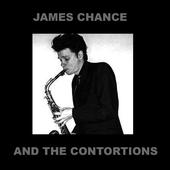So, this is not the actual James Chance and the Contortions, just a fan page. .. simply because james chance is fucking amazing. oh shit! yeah. so listen, and love, the dictator of disco sofisco, the furor of the flaming funk, the laziest man in show business, the sax maniac himself... Mr. James Chance and the Contortions!!!
Here is some background info on this mu fucka
Chance arrived in New York from his native Milwaukee in the mid '70s, hauling his saxophone and his given surname, Sigfried. He soon hooked up with Lydia Lunch and her crew of downtown adolescent artists/mischief-makers, playing briefly in the seminal Teenage Jesus and the Jerks, but he left in 1977 to form his own band, The Contortions. Maybe more than anyone else in the so-called No Wave set, Chance was fascinated with black music of the era, and with The Contortions, sought to integrate the horn-spiked stop-on-a-dime rhythms of funk and the heady freedom of Ornette Coleman's sax playing with the confrontational and political theatricality of punk.A tight rhythm section provided the band's funky skeleton, while open-tuned slide guitar, lurching organ, squawking sax, and all manner of groans and yells gave The Contortions their wild dissonance. Even today, with numerous bands in the post-punk renaissance acknowledging their indebtedness to No Wave in general and Chance in particular, The Contortions' blend of organized twitchiness and raw anarchy sounds remarkably unique. But like the scene to which they were so central, The Contortions burned out quickly, releasing only one album, Buy the Contortions, along with the four songs they contributed to Brian Eno's legendary No New York comp.Chance soon resurfaced as James White (in honor of James Brown) with a new band called The Whites which actually featured almost the same personnel as The Contortions. Part parody, part homage, part smirking catastrophe in action, James White and the Blacks moved away from the punk that had defined their earlier incarnation, and towards a fusion of the soul, funk, and free jazz with disco that ranks as one of the weirdest musical hybrids of its era. But like all of Chance's endeavors, The Blacks' one album, Off White, called into question in all sorts of interesting ways the meaning of "black" music and "white" music and the ways racial identity is inscribed in artistic creations of any sort.
